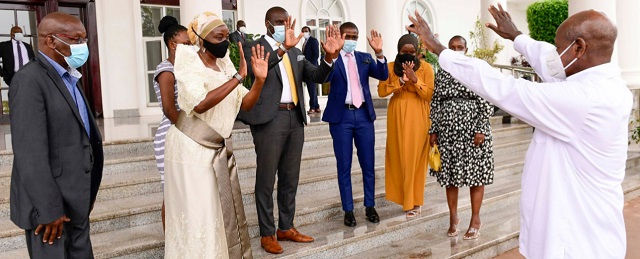
Will Leadership Code Tribunal finally bite?
Kampala, Uganda | RONALD MUSOKE | When President Yoweri Museveni swore in the Leadership Code Tribunal recently, he demanded the new team clean up public service of corrupt officials.
The tribunal is the latest institution Museveni has created to fight corruption in Uganda’s public service. Museveni said the tribunal is not a duplication of roles with other government institutions but rather a supplement for efficiency.
“We already have the police and IGG but we still have a lot of corruption in the public service; that is why I initiated the Anti-Corruption Unit in State House and now this tribunal,” he said.
The tribunal which has similar powers of the High Court to hear and pass judgment on leaders who fail to abide by the code was supposed to be in place over 25 years ago following the creation of the Inspectorate of Government.
It is chaired by Dr Roselyn Karugonjo and deputized by Asuman Kiyingi while its other members include; Jane Arume, Didas Bakunzi and Joyce Nalunga.
At the swearing in ceremony of the new team, Rev. Fr. Simon Lokodo, the Minister of State for Ethics and Integrity said creating the tribunal—the first of its kind in eastern Africa— is more evidence of President Museveni’s “zero tolerance to corruption.”
Observers and actors in Uganda’s anti-corruption fight have welcomed the tribunal but others remain guarded.
“The Inspectorate of Government’s role in enforcing the (leadership) code is to receive, examine and verify declarations lodged by leaders; investigate breaches of the code and refer the matter to the Leadership Code Tribunal for adjudication,” said Munira Ali, the strategic partnerships and public relations officer at the Inspectorate of Government, explaining the role of the tribunal.
The leadership code was first introduced in Uganda in 1992. It required leaders, their spouses and children (under 18) to make a public declaration of their wealth, assets and liabilities to the Inspector General of Government. In 2002, parliament enacted the Leadership Code Act (2002), which provided detailed enforcement procedures for the Inspectorate of Government.
The law compels public service leaders to within three months of becoming a leader and there after every two years during the month of March submit to the Inspectorate of Government a written declaration of their income, assets and liabilities in the prescribed form. The leaders are also expected to repeat the exercise before the expiration of their term of office. This is to be done six months after their last declaration.
But without the tribunal, the Inspectorate of Government has on many occasions been challenged in the court by non-compliant leaders who have always argued that the Inspectorate of Government does not have powers of trying them in court.
In 2004, former IGG, Irene Mulyagonja, asked President Museveni to dismiss Fox Odoi, the former presidential legal advisor and former MP (West Budama County), for failure to declare his wealth.
However, Odoi successfully challenged the IGG in the Constitutional Court. In April 2010, the Supreme Court also overturned the removal of John Ken Lukyamuzi from the 7th Parliament after being dragged to court by the IGG for not declaring his assets, income and liabilities.
Ken Lukyamuzi told The Independent on Sept.2 that “his win in the Supreme Court rescued public officials from the ‘dictatorial hand’ of the IGG who instead of handling the leadership code impartially ended up acting like the police, the judge and the court.”
Lukyamuzi said he thought the IGG’s office was being involved in partisan politics. He said up to 35 MPs had failed to declare their wealth in time but he was the only one barred from standing for re-election in the 2006 parliamentary election.
Cissy Kagaba, the executive director of the Anti-Corruption Coalition-Uganda told The Independent on Sept.2 that she now expects the Leadership Code Tribunal to lighten the load of the Inspectorate of Government which has previously been accused of being “the prosecutor and the judge.”
Before the tribunal was constituted recently, Kagaba said, the law was more or less redundant. This is also the view of Augustine Ruzindana, who served as Uganda’s first Inspector General of Government between 1986 and 1996.
“There should have been a link between the Inspectorate of Government and the Leadership Code Tribunal,” Ruzindana told The Independent on Sept.3, “You cannot have enforcement of the Leadership Code when the tribunal is not there.”
But Ruzindana quickly added that the leadership code remains with one big challenge—the failure by the public to access the declarations made by Uganda’s public officials to the IG.
The post Fighting corrupt public servants appeared first on The Independent Uganda:.
from The News Today – The Independent Uganda: https://ift.tt/3i938X7
0 Comments